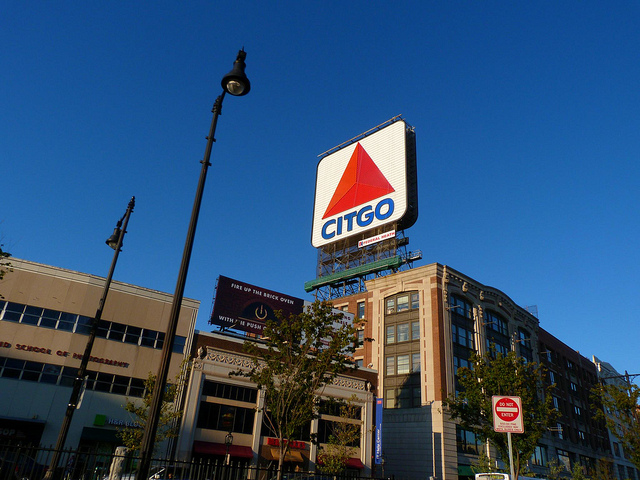
March 21, 2017; CBS Boston
The increasingly disastrous state of Venezuela’s finances has begun to affect citizens of the northern hemisphere now that Venezuela’s nationalized oil company, Citgo, has been unable to donate heating oil to the Massachusetts-based nonprofit Citizens Energy. The politicization of aid used to benefit Americans (at least in this instance), but now it poses a grave danger to Venezuelans.
The basic facts of the situation are these: Venezuela used to provide free crude oil to heat low-income American households through Citizens Energy, a charity run by former Massachusetts Congressman Joseph P. Kennedy II. Thanks to inflation, declining oil prices, and other factors, Venezuela’s economy has suffered a disastrous contraction, and the nationalized oil company Citgo has declined to provide the oil for two years. However, despite dire shortages of basic necessities and entreaties from Kennedy and other Americans, President Nicolás Maduro has refused to admit that it is his country’s time of need.
The partnership between Citgo and Citizens Energy was, in some ways, a precursor to today’s rage-fueled donation drives to organizations like Meals On Wheels. In 2005, Hurricane Katrina damaged U.S. refinery capacity, causing energy prices to soar, and Kennedy criticized President Bush for not doing enough to help the poor people affected by the price spike. When that didn’t help, he reached out to Venezuelan president Hugo Chávez, who had a contentious relationship with President Bush (he called Bush “the devil” in a U.N. speech in 2006). Chávez agreed to donate crude oil to help his shivering northern neighbors. The New York Times reported in 2009,
Since 2005, Citizens’ 877-JOE-4-OIL campaign has been sustained by the oil fields of Venezuela. Chávez, who controls the industry there, has delivered crude oil at no charge to a Citizens affiliate, which has resold it and used the money to pay for oil deliveries to America’s poor. In the past two years, Citizens has been given 83 million gallons of crude by Chávez and sold it for $164 million—money used to fund almost its entire philanthropic mission.
Residents of over a dozen states, including Massachusetts, Wisconsin, Maine, and New Hampshire, benefited from this program. As relationships between the U.S. and Venezuela remain strained due to human rights and other concerns, JOE-4-OIL represented one of the few positive threads tying the two countries together.
Citizens Energy, which has absorbed Kennedy’s professional energies since he left office in 1999, provides heat assistance not only to residents but also to homeless shelters; they provide grants for heating fuel and financing for energy efficiency upgrades, freeing up shelter resources to be devoted to programs for residents. The organization also runs a Solar Homes program, which provides applicants with a free 20-year lease on solar electric panels, supporting both poverty relief and sustainable energy.
Sign up for our free newsletters
Subscribe to NPQ's newsletters to have our top stories delivered directly to your inbox.
By signing up, you agree to our privacy policy and terms of use, and to receive messages from NPQ and our partners.
Kennedy has been criticized for his continued ties to a country with a record of human rights abuse; detractors pointed out that he was lending his politically prestigious American family name to an authoritarian regime. He remained unfazed. “I have asked every single oil company, and not one of them has given me a gallon to help the poor,” he said. “Is the Venezuelan government worse than the Saudi Arabian government? Is it worse than the Russian government? Don’t be telling me that I’m in some kind of collusion with the Venezuelan government when they’re the only ones who have showed some willingness to help our poor.”
In the past couple of years, inflation and lowering oil prices have combined to devastate Venezuela’s economy. Previously, the abundant oil wealth prompted the government to hand out free or below-cost cars and microwaves and to subsidize basics like bread and milk. But in October 2016, the Guardian reported that Venezuela had “the world’s fastest contracting economy, the second highest murder rate, inflation heading towards 1,000 percent and shortages of food and medicine that have pushed the poorest members of its 30 million population to the edge of a humanitarian abyss.” People arrive at the supermarket with suitcases of bolivars, only to find there is no rice or flour on the shelves. Hospitals are unable to help patients because they have no antibiotics, anesthesia, or even reliable water supply.
In such a circumstance, it can hardly be surprising that the nationalized oil company does not send millions of barrels of oil, virtually the country’s only source of income, to its wealthy northern neighbor, no matter how much its presidents previously enjoyed making the political gesture.
Now, the Venezuelan poor are the ones who need help, and President Nicolás Maduro refuses to accept it. Other South American countries, including Peru and Bolivia, offered to send food and medicine, but Maduro has blocked aid and refused to admit the extent of the crisis.
Kennedy said he has tried to reach the Maduro administration to offer assistance, but has not been able to reach a solution. U.S. foreign aid to Venezuela, which decreased 65 percent between 2015 and 2016, goes overwhelmingly to democracy, human rights, and governance.
In past years, Representative Kennedy and Citizens Energy were not too proud to accept aid from an uneasy source when it helped people who needed it. We can only hope that President Maduro will learn from this example and accept aid for his people before it is too late for more of them.—Erin Rubin












